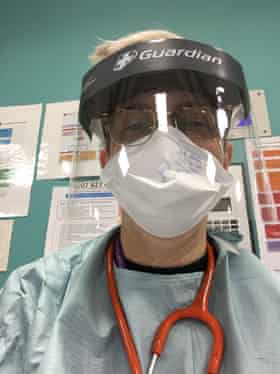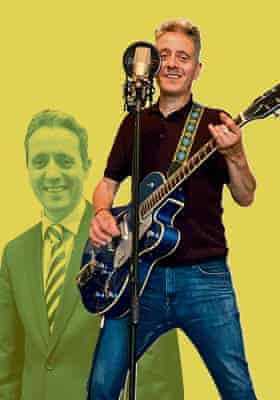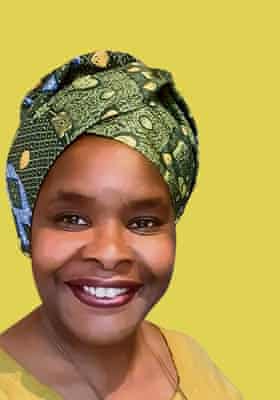Alison Webster was once showing prospective students around the university where she was studying medicine when a sixth former said: “You’re so old – why are you even doing this?” Webster laughs at the memory, home after the end of a shift as an A&E doctor. “I said, ‘When you go home, ask your mum if she likes her life. I bet there’s something your mum’s always wanted to do that she’s not had the opportunity to do because of you. Ask what her dreams were, and see if she has fulfilled them.’”
Webster’s childhood dream was to be a doctor, but she didn’t do well in her A-levels, “so that got put to one side. But it was always in there.” She ran a music distribution company, but as she approached her 40s, the business was struggling and she had started to wonder what to do with the rest of her life. Was a career in medicine really out of reach?

She looked into it, realised her A-level results wouldn’t matter because she had done well in an accountancy degree in her 30s, and applied to medical school. She started her medical degree at the age of 41. “I thought, I’ve probably got at least another 20 years of work so I might as well do something that makes more sense to me, rather than not stretching myself or enjoying it.’”
Working through the pandemic has been “really difficult and emotional”, but she has thrived on the challenge. She says she doesn’t feel “brave” to have given up her former career (and says she was lucky to have a husband who earned enough to cover her seven years of study). “I just had to do it.”
The pandemic has made many of us reevaluate our lives. One poll earlier this year found that three in five workers planned to make changes, either in the form of new qualifications and skills, or a total career change. Before, says Helen Tupper, CEO of Amazing If, a career development company, a common trigger was a life change or redundancy. Now, “as a result of Covid, people are unpacking their career more. I think it made people think, is this actually what I want to do? And if the answer is no, what else could I do?”
The direction may not be obvious, but you can start to identify it, says the life coach Fiona Buckland. “You’ve got to take some time and space. You will not figure this stuff out in between your emails.” It doesn’t require a month-long sabbatical or even a week off – you could spend an hour a week, broken down into smaller chunks if necessary, for a bit of self-reflection. Buckland has a list of questions on her website that can help identify goals and values, but there are lots more online, she points out. “Questions like, what are you most proud of? What is the greatest service you’ve given? When do you feel most connected to yourself? People often start to think: what am I interested in? But it’s more important to think about your values, because they are your inner code. When you’re living your life according to your values, you feel aligned and when you don’t, that’s when you’re going to feel that kind of frustration or dissatisfaction. So a good thing to do is to think about a time you felt really alive.”
Buckland gets her clients to do a visualisation exercise, imagining they are elderly and at the end of their life, and at a party to celebrate their achievements and the difference they’ve made. “As you go into this party, people come and thank you; what are they thanking you for? It tunes people in to what is meaningful. What would make a meaningful life, not always a happy one? It might be how you’re making a difference, and it doesn’t have to be world-changing stuff, it can be: ‘I really want to be there for my kids,’ or: ‘I want to make my neighbourhood a more beautiful place to live.’”
To make a change requires courage (and some compassion, Buckland points out, because change can be difficult), but it can be done in smaller, regular steps rather than a giant leap. “That’s what makes change, not suddenly, ‘Right, I’m selling my house and running off.’”
How do you know when it’s time? “You will feel it. There will be this kind of call,” says Buckland. “It might show up in dissatisfaction, or it might show up in excitement about something, so just listen out for it. The more that you are spending time with yourself, not distracted by phones and things like that, the more likely you are to hear that. You’re engaging different parts of your brain than the one that’s just reacting to everything, because it takes deeper thought, questions like: Where do I want to be in the next 10 years?”
A callout to Guardian readers for this article revealed a range of changes for the better that people made in midlife, from losing weight to embracing new romantic relationships, or coming out as gay. It can be both frightening and exciting to embark on a second chapter, so who better to learn from than those who have done it?
In her 20s, Elizabeth Hepworth was in a serious car accident that cut short her degree. She spent the next few years having reconstructive surgery on her face, and to save her sight (she lost her sight in one eye). She married, had three children and became “a Stepford wife. I was at home, supporting my husband in his career, looking after the family, vacuuming twice a day.” She was in her 30s when he walked out. “I sat at the bottom of the stairs and the children were howling around me, and – excuse my language – I thought, what the fuck am I going to do now?”

Having to support herself for the first time in her life, she got a job at a solicitors’ office and, because she had some legal knowledge – her abandoned degree had been in English, French and law – she became a paralegal. She was given some simple conveyancing and divorce cases to work on. “I took to it like a duck to water,” Hepworth says.
Then she went back to university to do a law degree. Her childhood dream was to be a barrister, but it would be a precarious self-employed position, so she became a solicitor, qualifying in her early 40s. In 2003, the chance came up to train as a barrister. “I absolutely grabbed it,” she says. By then, her children had grown up and she was “a bit more free. I thought, this is payback time – life is giving me my opportunity back again. It still sends shivers down my spine when I think about it – a sense of gratitude that fate had given me back something at the age of 55 that had been taken from me.”
At 72, Hepworth is still working. “The one thing I would say to people is, do not consider age to be a barrier to do anything that you have always dreamed of,” she says. Making a change is “life-affirming. It is refreshing. You have a tremendous sense of self-renewal, which goes with your sense of self-achievement, and I would recommend it to anybody. I think older people have so much to offer because while we don’t have perhaps the physical tenacity, we have a great deal to offer in terms of life experience, which can be translated into helping others.”

The pandemic was the driving force behind Robert Campbell’s decision to go from being a headteacher to a songwriter – that, and the heart attack he had had in 2019, at the age of 53. “I think it was directly linked to having a stressful job for all those years because I was actually quite fit – I did a two-hour fell run the week before.” He went back to work after five weeks, then coronavirus hit the country. Suddenly, working from home and with more time, he picked up his guitar and started playing between Zoom meetings, and coming up with songs.
“The one regret I have in my life was not studying music at university,” he says. He decided that, after 30 years, he wouldn’t go back to teaching in September; this year he starts an MA in songwriting. It helps, he says, that he can rely on his partner’s salary (she is also a headteacher) and that his three children have grown up, with the youngest just graduating – many of the midlife life-changers I speak to have some financial stability and fewer caring responsibilities.
Covid also made him reconsider what was important. With some part-time work, “I’m earning a 10th of what I earned, but if you’re prepared to accept compromise, then you probably can do things. Sometimes it’s our mindsets that hold us back, not practical issues. Fear. What will our friends say? What will our family say?” Be brave, he advises. “I don’t think life is: go to school, work 40 years, then you retire and wait to die. That age has gone, thankfully.”

For Melanie de Castro Pugh, the trigger was getting a handle on her health. Like Alison Webster, she had wanted to be a doctor, “but I didn’t get into medical school so I studied biology instead”. In the middle of working towards a PhD, she was diagnosed with type 1 diabetes. “This was in 1998, and the management techniques weren’t anywhere near as good as they are now,” she says. She reluctantly had to give up her PhD and took a sales job, married, had a son and became a stay-at-home mother.
A blanket ban that stopped people with insulin-managed diabetes from driving large vehicles was overturned in 2012, although individual ambulance services currently have their own policies and assessment processes around who is allowed to drive an ambulance. So, when her son was older, De Castro Pugh considered training as a paramedic. Her health had been a big obstacle to living her life to the full, but she started to manage it successfully through a very low-carbohydrate diet and an implanted insulin pump. She applied to Swansea University to do a paramedic science degree, and started in September 2019. “The first day I arrived, I was so thrilled to be back in that environment,” she says. “It was fantastic going to the library, being in lectures.”
The pandemic put a stop to her university experience – though she continued to do placements – but she still loved it. Next month, she starts her first job. “I’m finally getting to do – at the ripe old age of 47 – what I’ve wanted to do since I was a little girl,” she says. “Never give up on your dreams just because life gets in the way.”
Tupper, in her work as a careers development consultant (a business she started after a first career at Microsoft), advises people to “explore first, and build a bridge”. Doing your research means “you’re not making assumptions about a role that might not actually reflect the reality of it. You want to know that it’s going to be a good fit for your strengths and values.” Then, she says, “build a bridge, so it doesn’t feel like a giant leap into the unknown. Could you be mentored by somebody who does that role? Is there a side project you could do to give you some exposure to that?”

Maureen Brettell did those things when she left her first career as a town planner. “I found that the reality was that I was standing in the middle of two people arguing about two inches where a fence line should be. I didn’t feel like I was doing anything to help people on the scale that I wanted to.” She had always wanted to be a teacher, so she spent time researching it, working at youth clubs and approaching schools to ask if she could volunteer before taking the leap and retraining.
She is now headteacher of a school for young people with social, emotional and mental health needs, and loves it. “It’s the job satisfaction, actually feeling that my efforts are making a difference to people.” In her school, particularly, “these young people have so many things that have gone on in their lives, so many traumas, disadvantages; their little shoulders are bearing so much weight. Creating an environment where they can let go of that, I can look back every day and think I’ve given them a few hours where they felt safe, happy, wanted and loved.”
Brettell thinks it is important not to make a change “on the spur of the moment. Think carefully, weigh up the pros and cons. Do your research, talk to different people – some will have had positive experiences, but it’s more important to seek out anyone who isn’t enjoying it because they will be able to give you a more balanced view.”

Margot also found more meaning in teaching, having worked as an auditor at a publishing company. As part of the company’s corporate social responsibility programme, she volunteered to be a reading mentor for children in deprived areas of central London, and that soon became the highlight of her week. She started teacher training in her 30s. “I was really out of my comfort zone but it was worth it. Despite there being lots of stresses as a primary school teacher, there’s something uplifting when you have made a difference to one child who has managed to understand some mathematical thing, or you’ve done an assembly where they were all singing and dancing, and they have smiles on their faces. That’s something that I could never have got previously.”
Margot has learned: “It’s important to be honest with yourself, and sometimes that’s hard and it’s easier just to carry on. When there is that small, nagging doubt, take time to explore it and see if it develops. It’s not always easy and it’s not always what you imagined it to be, but I think it ultimately moves you forward.”
She thinks it made her more confident in her ability to make decisions when she decided to move back to Scotland, first to work in a school in Edinburgh, and then to step back from teaching and move to a farm in the Highlands, where she and her partner now have cattle and sheep, while she works as a supply teacher. “I think that going against what a lot of people were saying at the time, by becoming a primary school teacher – ‘Are you crazy, you’re going to have a drop in salary’ – and it working out, it probably did give me the confidence to then make another change.” She fulfilled a new dream by getting a dog.

Some people, however, seem to almost stumble into happiness, with no grand plan. As a child, Jack Rawlinson had a train set but wasn’t very interested in it. “I had never thought of being a train driver,” he says. He had worked in IT for three decades. “In your 20s, you get on to a wheel, start earning a bit of money. Before you know it, you’re in your 30s, reasonably successful and it seems like you’re trapped.”
He was approaching his 50s when he realised he couldn’t do it any more. “It was stressing me out: you can’t ever really leave it at the office, you’re always thinking about the next progress meeting. I thought, ‘If I don’t get out of this, I’m probably looking at serious health problems.”
In 2010, thinking he might become a delivery driver, he saw an advert for trainee train drivers and the more he read about it, the more he thought it would suit him. “One of the things that had been driving me crazy about office life was Monday to Friday, nine to five. Being a train driver, you work in shifts.”
It’s not for everyone, he says, but for him, “I’m not on the rat wheel”. Rawlinson says it is the only job he has ever had, “that I can honestly say I enjoy. It’s turned out so much better than I could have anticipated.” He laughs down the phone, at the end of one of his shifts. “Pure luck, really.”
Stay connected with us on social media platform for instant update click here to join our Twitter, & Facebook
We are now on Telegram. Click here to join our channel (@TechiUpdate) and stay updated with the latest Technology headlines.
For all the latest Education News Click Here
For the latest news and updates, follow us on Google News.
